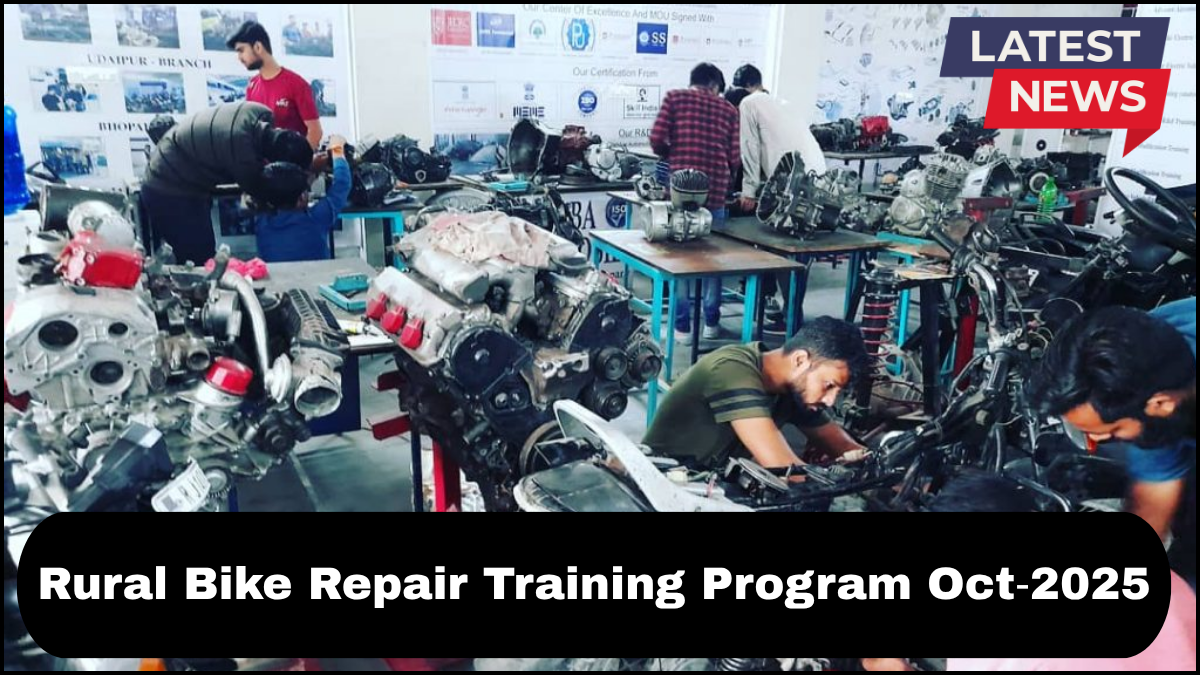In October 2025, the Bike Repair Training Villages 2025 initiative is set to transform rural livelihoods across the country. This structured and skill-based program is designed to equip youth and underemployed individuals in remote areas with hands-on knowledge and real-world experience in two-wheeler repair and maintenance.
With an increasing number of motorcycles and scooters in rural regions, the demand for competent mechanics has grown sharply. The rural bike servicing program aims to meet this need while fostering self-reliance and employment opportunities within village communities.

Why Bike Repair Training Matters in Rural Areas
Motorcycles are a lifeline in rural areas—they connect villages with towns, markets, schools, and healthcare centers. Yet, access to reliable repair services remains limited. Riders often travel miles just to get a puncture fixed or routine maintenance done. This program addresses the gap by creating skilled technicians within the community itself.
Moreover, youth unemployment remains a pressing issue in rural India. The Bike Repair Training Villages 2025 initiative offers not just a skill, but a pathway to self-employment and income generation.
Program Overview and Curriculum
The October 2025 rollout includes 100+ training centers strategically located in rural clusters. These centers will offer a 6-week intensive training schedule, combining theoretical classes and hands-on practice.
Key Modules Include:
-
Basics of Two-Wheeler Mechanics: Understanding components, functions, and common issues.
-
Engine Diagnostics & Repair: Step-by-step instruction on troubleshooting engine problems.
-
Electrical Systems: Wiring, lighting, ignition systems, and battery maintenance.
-
Servicing & Maintenance Protocols: Regular check-ups, oil changes, air filters, etc.
-
Workshop Management: Inventory handling, customer interaction, and pricing strategies.
-
Entrepreneurship Support: Guidance on setting up local bike repair shops post-training.
Each module is taught in local languages to ensure comprehension and retention. Trainees are evaluated through practical assessments and project work to certify their readiness for real-world challenges.
Real Impact, Real Stories
Consider the case of Manjeet, a 19-year-old from a village in Madhya Pradesh. With little formal education and no clear career path, he joined the pilot phase of the rural bike servicing program last year. Today, he runs a small but busy repair shed and earns more than ₹15,000 a month—significantly improving his family’s quality of life.
Stories like Manjeet’s will multiply as the October 2025 phase rolls out, empowering hundreds to take control of their economic future.
Support Infrastructure and Partnerships
The success of the Bike Repair Training Villages 2025 program depends on strategic collaboration. Government agencies, NGOs, and private sector partners are contributing to this effort by providing training material, equipment, certification, and microfinance options for post-training enterprise.
To ensure sustainability, each training center is linked to a local mentor network—experienced mechanics who guide and support graduates as they start their own service operations.
Certification and Employment Pathways
Trainees completing the program receive government-recognized certification, boosting their credibility and employability. While many will set up independent bike repair units in their villages, others may join established workshops, delivery fleets, or two-wheeler dealerships.
The training program opens a spectrum of career opportunities with the potential to scale up—some may go on to specialize in electric vehicles or become multi-brand service providers.
Long-Term Vision
The October 2025 rollout is just the beginning. The goal is to train over 10,000 individuals by 2026 and establish bike servicing infrastructure in every rural block. This initiative ties into broader goals of rural development, skill empowerment, and job creation.
As motorcycles continue to dominate rural mobility, the Bike Repair Training Villages 2025 program offers a forward-thinking solution rooted in local needs.
Frequently Asked Questions (FAQs)
Q1: Who is eligible for the Rural Bike Repair Training Program?
A: Youth aged 18–30 from rural areas with basic literacy can apply. Priority is given to unemployed individuals and school dropouts.
Q2: Is there any fee for the training?
A: Most centers offer free training or charge a nominal fee. Financial aid or sponsorships are available through partner NGOs and government schemes.
Q3: Will tools and equipment be provided?
A: Yes, during training. Graduates may also get access to subsidized toolkits or microloans to start their own workshops.
Q4: How do I apply?
A: Applications can be submitted through local Gram Panchayats, community centers, or directly at the designated training centers starting in August 2025.
Q5: What kind of job opportunities will be available after training?
A: Graduates can start their own bike servicing units, work in existing garages, or find employment with logistics companies and dealerships.
click here to learn more